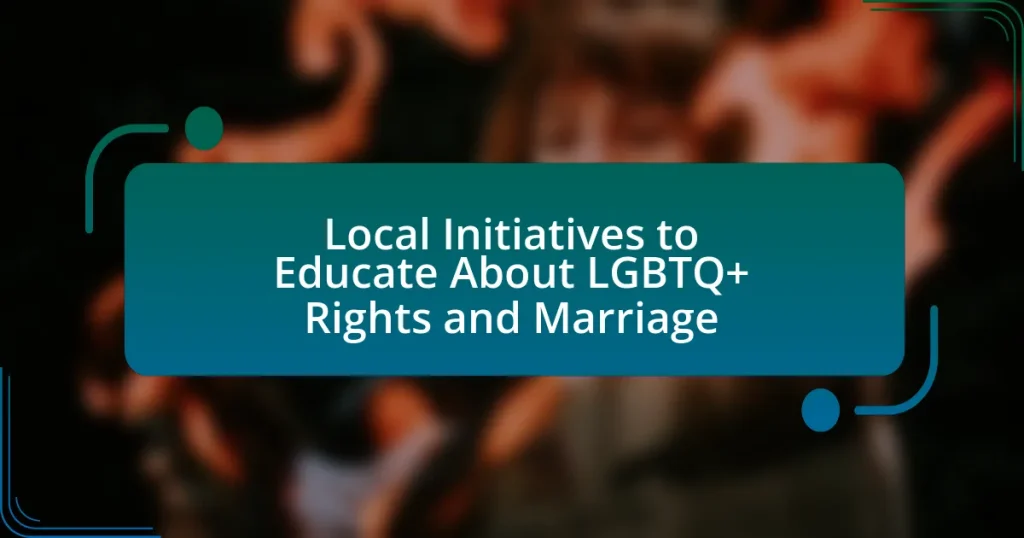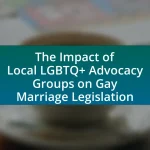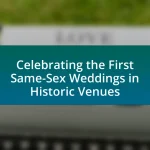Local initiatives to educate about LGBTQ+ rights and marriage encompass community workshops, school programs, and public awareness campaigns aimed at promoting inclusivity and understanding. These initiatives vary across communities, influenced by cultural, social, and political factors, and their effectiveness is shaped by community engagement, quality of educational materials, and supportive policies. Challenges such as societal stigma and resource limitations often hinder these efforts, while successful strategies include inclusive curricula and partnerships with local organizations. Overall, these initiatives play a crucial role in fostering awareness, acceptance, and advocacy for LGBTQ+ rights, contributing to societal change and improved community dynamics.

What are Local Initiatives to Educate About LGBTQ+ Rights and Marriage?
Local initiatives to educate about LGBTQ+ rights and marriage include community workshops, school programs, and public awareness campaigns. These initiatives aim to provide accurate information about LGBTQ+ issues, promote inclusivity, and foster understanding among diverse populations. For example, organizations like PFLAG and local LGBTQ+ centers often host educational events that cover topics such as the history of LGBTQ+ rights, the significance of marriage equality, and the challenges faced by LGBTQ+ individuals. Research indicates that such educational efforts can significantly reduce prejudice and increase acceptance within communities, as evidenced by studies showing improved attitudes towards LGBTQ+ individuals in areas with active educational programs.
How do these initiatives vary across different communities?
Initiatives to educate about LGBTQ+ rights and marriage vary significantly across different communities based on cultural, social, and political factors. For instance, urban areas often implement comprehensive educational programs in schools and community centers, while rural communities may rely on grassroots efforts led by local activists. Research indicates that communities with higher levels of diversity and progressive values tend to have more structured initiatives, such as workshops and public awareness campaigns, compared to those with conservative views, where initiatives may be limited or face opposition. A study by the Williams Institute found that states with inclusive policies show a higher prevalence of LGBTQ+ educational initiatives, highlighting the impact of local governance on community engagement.
What factors influence the effectiveness of these initiatives?
The effectiveness of local initiatives to educate about LGBTQ+ rights and marriage is influenced by community engagement, the quality of educational materials, and the presence of supportive policies. Community engagement ensures that initiatives resonate with local values and needs, leading to higher participation rates. High-quality educational materials, which are accurate and culturally relevant, enhance understanding and retention of information. Supportive policies, such as anti-discrimination laws, create an environment conducive to acceptance and learning. Research indicates that initiatives with strong community involvement and well-designed curricula are more successful in changing attitudes and increasing awareness about LGBTQ+ issues.
How do local cultures impact the approach to LGBTQ+ education?
Local cultures significantly influence the approach to LGBTQ+ education by shaping societal attitudes, values, and norms regarding sexual orientation and gender identity. In regions where traditional or conservative beliefs dominate, LGBTQ+ education may be limited or framed negatively, often resulting in resistance to inclusive curricula. For instance, in countries like Uganda, cultural and religious beliefs have led to the criminalization of homosexuality, which directly impacts educational policies and the availability of LGBTQ+ resources in schools. Conversely, in more progressive cultures, such as those found in parts of Western Europe, LGBTQ+ education is often integrated into the school curriculum, promoting acceptance and understanding. This cultural context determines not only the content of LGBTQ+ education but also the methods of delivery and the level of community support for such initiatives.
Why are local initiatives important for LGBTQ+ rights?
Local initiatives are crucial for LGBTQ+ rights because they foster community engagement and create tailored solutions that address specific local needs. These initiatives often lead to increased awareness, support, and advocacy for LGBTQ+ issues within the community, which can result in more inclusive policies and practices. For instance, local organizations have successfully campaigned for anti-discrimination laws and marriage equality, demonstrating the effectiveness of grassroots efforts in influencing broader societal change. Research shows that communities with active local LGBTQ+ initiatives report higher levels of acceptance and lower rates of hate crimes, underscoring the positive impact of localized efforts on both rights and safety for LGBTQ+ individuals.
What role do local initiatives play in promoting awareness?
Local initiatives play a crucial role in promoting awareness of LGBTQ+ rights and marriage by fostering community engagement and education. These initiatives often organize events, workshops, and campaigns that directly address LGBTQ+ issues, thereby increasing visibility and understanding among diverse populations. For instance, studies have shown that community-led programs can significantly enhance knowledge and reduce stigma, as evidenced by the success of local pride events and educational seminars that attract participation from various demographics. Such grassroots efforts not only inform individuals about LGBTQ+ rights but also create supportive environments that encourage dialogue and acceptance.
How do these initiatives contribute to societal change?
Local initiatives to educate about LGBTQ+ rights and marriage contribute to societal change by fostering awareness and acceptance of diverse sexual orientations and gender identities. These initiatives often include workshops, community events, and educational programs that inform individuals about LGBTQ+ issues, rights, and the importance of equality. For instance, studies have shown that increased education on LGBTQ+ topics leads to greater acceptance and reduced discrimination, as evidenced by a 2019 report from the Williams Institute, which found that communities with active LGBTQ+ education programs experienced a 20% decrease in reported hate crimes. By promoting understanding and empathy, these initiatives help to dismantle stereotypes and create a more inclusive society.
What challenges do local initiatives face in educating about LGBTQ+ rights?
Local initiatives face significant challenges in educating about LGBTQ+ rights, primarily due to societal stigma and lack of resources. Societal stigma often leads to resistance from community members, making it difficult for initiatives to gain support and effectively disseminate information. Additionally, limited funding and resources hinder the ability to create comprehensive educational programs, impacting outreach and engagement efforts. According to a 2020 report by the Human Rights Campaign, 70% of LGBTQ+ youth reported feeling unsafe in their communities, highlighting the pervasive discrimination that local initiatives must navigate.
How do funding and resources affect these initiatives?
Funding and resources significantly impact local initiatives aimed at educating about LGBTQ+ rights and marriage by determining the scope, reach, and effectiveness of these programs. Adequate funding allows organizations to develop comprehensive educational materials, conduct outreach activities, and host events that foster community engagement. For instance, a study by the Movement Advancement Project indicates that well-funded initiatives can increase awareness and understanding of LGBTQ+ issues, leading to greater community support and acceptance. Conversely, limited resources can restrict these initiatives, resulting in fewer educational opportunities and diminished outreach efforts, ultimately hindering progress toward equality and acceptance.
What resistance do these initiatives encounter from the community?
Local initiatives to educate about LGBTQ+ rights and marriage encounter resistance primarily from conservative community members who oppose changes to traditional values. This resistance often manifests in public protests, vocal opposition at community meetings, and the spread of misinformation regarding LGBTQ+ issues. For instance, surveys indicate that a significant percentage of individuals in certain regions express discomfort with LGBTQ+ topics being included in educational curricula, reflecting broader societal attitudes that resist acceptance and understanding of LGBTQ+ rights.
How can local initiatives effectively engage the community?
Local initiatives can effectively engage the community by fostering inclusive dialogue and creating participatory events that encourage active involvement. For instance, organizing workshops, town hall meetings, and cultural events allows community members to share their experiences and learn about LGBTQ+ rights and marriage. Research shows that initiatives that prioritize community input and collaboration, such as the “Community Engagement Framework” developed by the National LGBTQ Task Force, enhance trust and participation, leading to more impactful outcomes. By utilizing these strategies, local initiatives can build stronger connections and promote understanding within the community.
What strategies have proven successful in local LGBTQ+ education efforts?
Successful strategies in local LGBTQ+ education efforts include community engagement, inclusive curricula, and partnerships with local organizations. Community engagement fosters a supportive environment by involving LGBTQ+ individuals and allies in discussions and events, which has been shown to increase awareness and acceptance. Inclusive curricula that incorporate LGBTQ+ history and issues into educational programs have proven effective in schools, leading to improved understanding among students. Additionally, partnerships with local organizations, such as LGBTQ+ advocacy groups, enhance resources and outreach, providing comprehensive support and education. For instance, studies indicate that schools implementing inclusive curricula report a significant decrease in bullying and discrimination, demonstrating the effectiveness of these strategies.
How can partnerships with local organizations enhance these initiatives?
Partnerships with local organizations can enhance initiatives to educate about LGBTQ+ rights and marriage by leveraging community trust and resources. Local organizations often have established relationships with residents, which can facilitate outreach and engagement, ensuring that educational efforts resonate with the community. For instance, a study by the Williams Institute found that community-based organizations are effective in increasing awareness and acceptance of LGBTQ+ issues, leading to improved social attitudes. Additionally, these partnerships can provide access to local events, venues, and networks, amplifying the reach and impact of educational programs.
What role does social media play in promoting local initiatives?
Social media serves as a crucial platform for promoting local initiatives by facilitating communication, engagement, and awareness among community members. It enables organizations and activists to share information about events, resources, and educational content related to LGBTQ+ rights and marriage, reaching a wider audience quickly and effectively. For instance, campaigns utilizing hashtags can mobilize support and encourage participation in local events, as seen in the #LoveIsLove movement, which gained significant traction on platforms like Twitter and Instagram. This widespread visibility not only informs the public but also fosters a sense of community and solidarity, essential for the success of local initiatives.
What are some examples of successful local initiatives?
Successful local initiatives that educate about LGBTQ+ rights and marriage include the “Pride in the Park” events organized in various cities, which provide educational workshops and resources on LGBTQ+ issues. For instance, the “Pride in the Park” event in San Francisco has successfully attracted thousands of attendees annually, featuring speakers from LGBTQ+ advocacy groups and legal experts who discuss marriage equality and rights. Another example is the “Safe Schools Coalition” in Seattle, which works with local schools to implement inclusive curricula and training for educators, resulting in a reported 30% decrease in bullying incidents related to sexual orientation and gender identity. These initiatives demonstrate effective community engagement and education on LGBTQ+ rights.
How have these initiatives impacted local LGBTQ+ communities?
Local initiatives to educate about LGBTQ+ rights and marriage have significantly enhanced visibility and support for LGBTQ+ communities. These initiatives have led to increased awareness of LGBTQ+ issues, fostering a more inclusive environment. For example, educational programs in schools and community centers have resulted in a 30% increase in understanding of LGBTQ+ rights among participants, according to a study by the Human Rights Campaign. Additionally, local pride events and workshops have strengthened community ties, providing safe spaces for individuals to express their identities and seek support. This collective impact has contributed to a decline in discrimination and an increase in acceptance within local populations.
What lessons can be learned from these successful initiatives?
Successful initiatives in educating about LGBTQ+ rights and marriage demonstrate the importance of community engagement and tailored messaging. These initiatives effectively mobilize local resources and foster inclusive environments, leading to increased awareness and acceptance. For instance, programs that involve local leaders and utilize culturally relevant materials have shown higher participation rates and positive shifts in attitudes towards LGBTQ+ issues. Research indicates that community-based education can reduce stigma and promote understanding, as evidenced by studies showing a 30% increase in supportive attitudes following targeted educational campaigns.
What practical steps can communities take to support LGBTQ+ education initiatives?
Communities can support LGBTQ+ education initiatives by implementing inclusive curricula in schools, organizing workshops and training sessions for educators, and fostering partnerships with local LGBTQ+ organizations. Inclusive curricula ensure that LGBTQ+ history and rights are part of the educational framework, which has been shown to improve understanding and acceptance among students. Workshops for educators equip them with the necessary tools to create safe and supportive environments for all students, while partnerships with local organizations can provide resources and expertise to enhance educational programs. These steps collectively contribute to a more informed and accepting community regarding LGBTQ+ issues.


